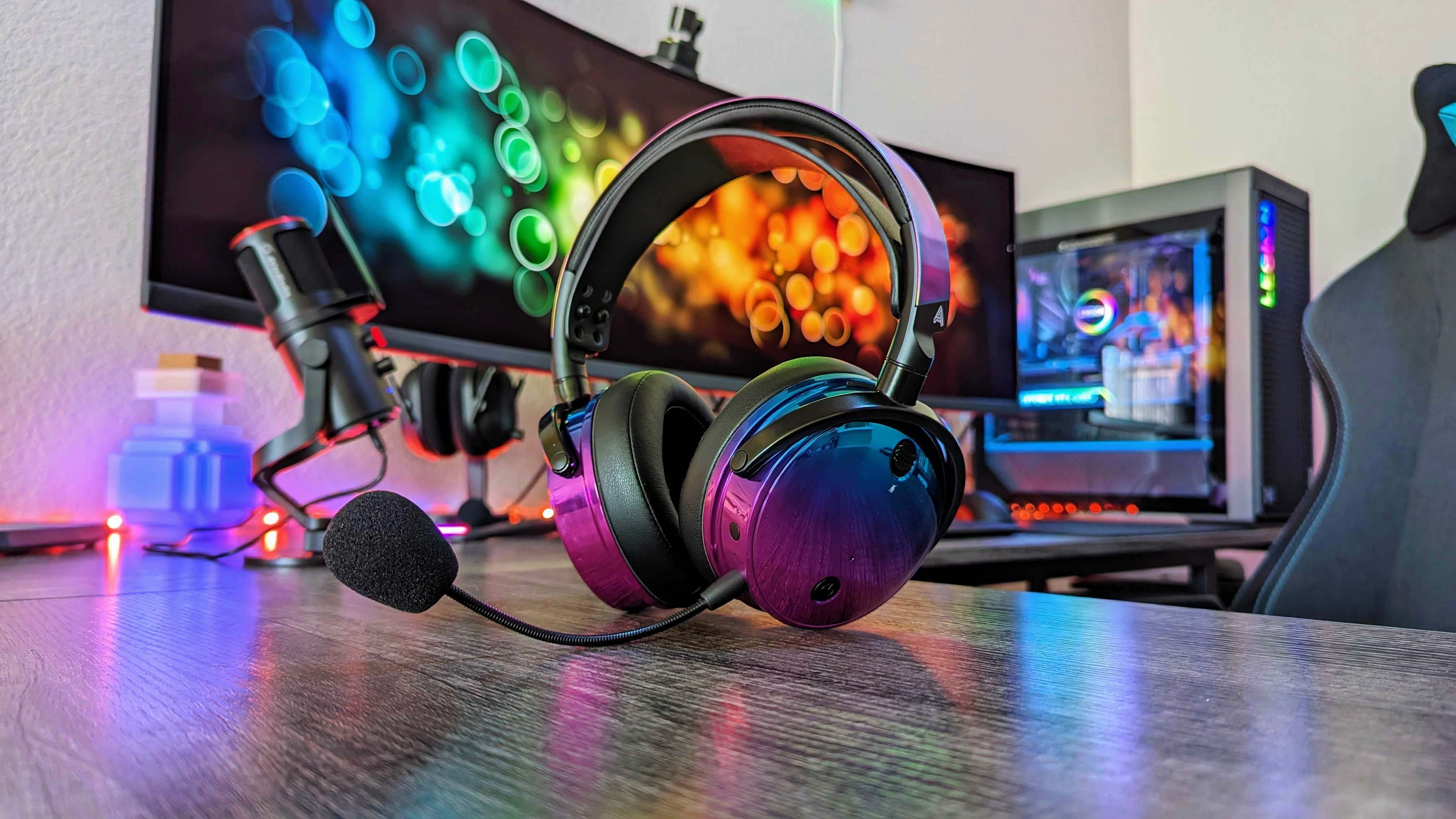
Audeze is on a mission to marry its audiophile legacy to the expanding gaming market, and the Maxwell wireless headset is the company's latest attempt to do so. With the Maxwell, Audeze has crafted one of the best-sounding and most premium wireless gaming headsets on the market that — on paper, at least — is capable of doubling as your everyday pair of headphones. All the right pieces are here, too, getting the Maxwell so close to delivering on its promises.
Let me preface by stating that the Audeze Maxwell is a great gaming headset for use across Xbox, Windows PC, and anything with Bluetooth connectivity. If you care about sheer audio fidelity above all else, it even counts among the best Xbox headsets in the world; what the Maxwell gets right, it gets very right. However, odd design designs and baffling limitations keep Audeze from achieving that perfect, highly desirable balance once again. Let's get into it.
Disclaimer: This review was made possible by a review unit provided by Audeze. The company did not see the contents of the review before publishing.
Audeze Maxwell review: Pricing and specifications
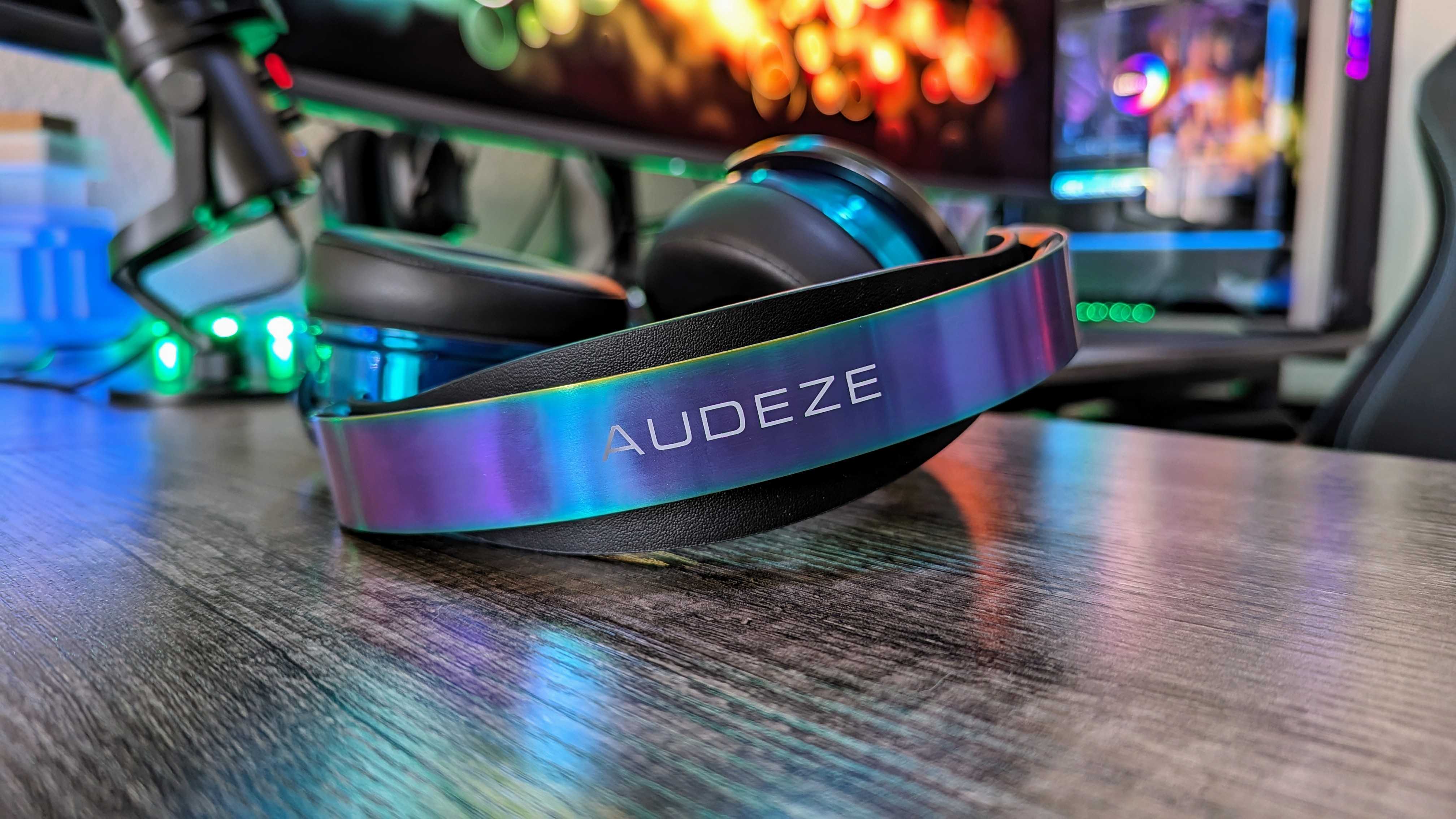
Pricing highlights
- The Audeze Maxwell comes in two forms: one for PlayStation (and everything else but Xbox) and one for Xbox (and everything else but PlayStation).
- The former retails for $299 and the latter for $329, as the Xbox version comes with a built-in Dolby Atmos license.
- This is undoubtedly a premium headset with incredible sound quality, but there's very steep competition in this price range.
- Value rating: 4/5
• Price: $329 at Audeze (Xbox) | $299 at Audeze (PlayStation)
• Connectivity: Ultra low-latency 2.4GHz wireless via USB Type-C dongle, Bluetooth 5.3 LE, hi-fi wired via USB Type-C, wired via 3.5mm audio jack
• Drivers: 90mm planar magnetic
• Microphone: Detachable hypercardioid boom, dual internal array
• Battery life: Up to 80 hours
• Extra features: Built-in Dolby Atmos license (Xbox version), on-board headset controls, mobile Audeze HQ app, simultaneous wireless connectivity
• Weight: 490g (1.08lbs)
• Platforms: Xbox Series X|S, Xbox One, Windows PC, PS5 (PlayStation version), macOS, Android, iOS, Switch
This is the most expensive wireless gaming headset I've ever used, and it's simply one of the most premium on the market in general. Audeze's latest offering is going toe-to-toe with serious industry heavy hitters, so it needs to stand out in order to justify that frighteningly high price tag. It's hard to say any headset this expensive is a good "value," but the Maxwell admittedly makes a fair case for itself... As long as you deeply care about audio fidelity.
The Audeze Maxwell starts at $299 at Audeze, but that's for the PlayStation-specific version, which doesn't work with Xbox consoles. The Xbox-specific variant of the Audeze Maxwell is actually $329 at Audeze, but you're not just paying extra for Xbox Series X|S and Xbox One compatibility. The Audeze Maxwell for Xbox comes with a built-in Dolby Atmos license, meaning you can enjoy industry-leading spatial audio without any extra fuss or fees. The PlayStation version is still Dolby Atmos-compatible, but you'll have to pay extra for that (Sony's Tempest 3D is still pretty solid, though).
Unfortunately, the Audeze Maxwell is rather elusive to get your hands on, constantly going on backorder. You'll need to move fast whenever it's in stock to purchase one. Once you get it, you'll find the Audeze Maxwell wireless gaming headset, the detachable boom microphone, a USB Type-C 2.4GHz wireless dongle, a USB Type-A to USB Type-C adapter cable, a USB Type-C to USB Type-C cable, and a 3.5mm audio cable in the box. There's no carrying case included here.
Audeze Maxwell review: Design and build quality
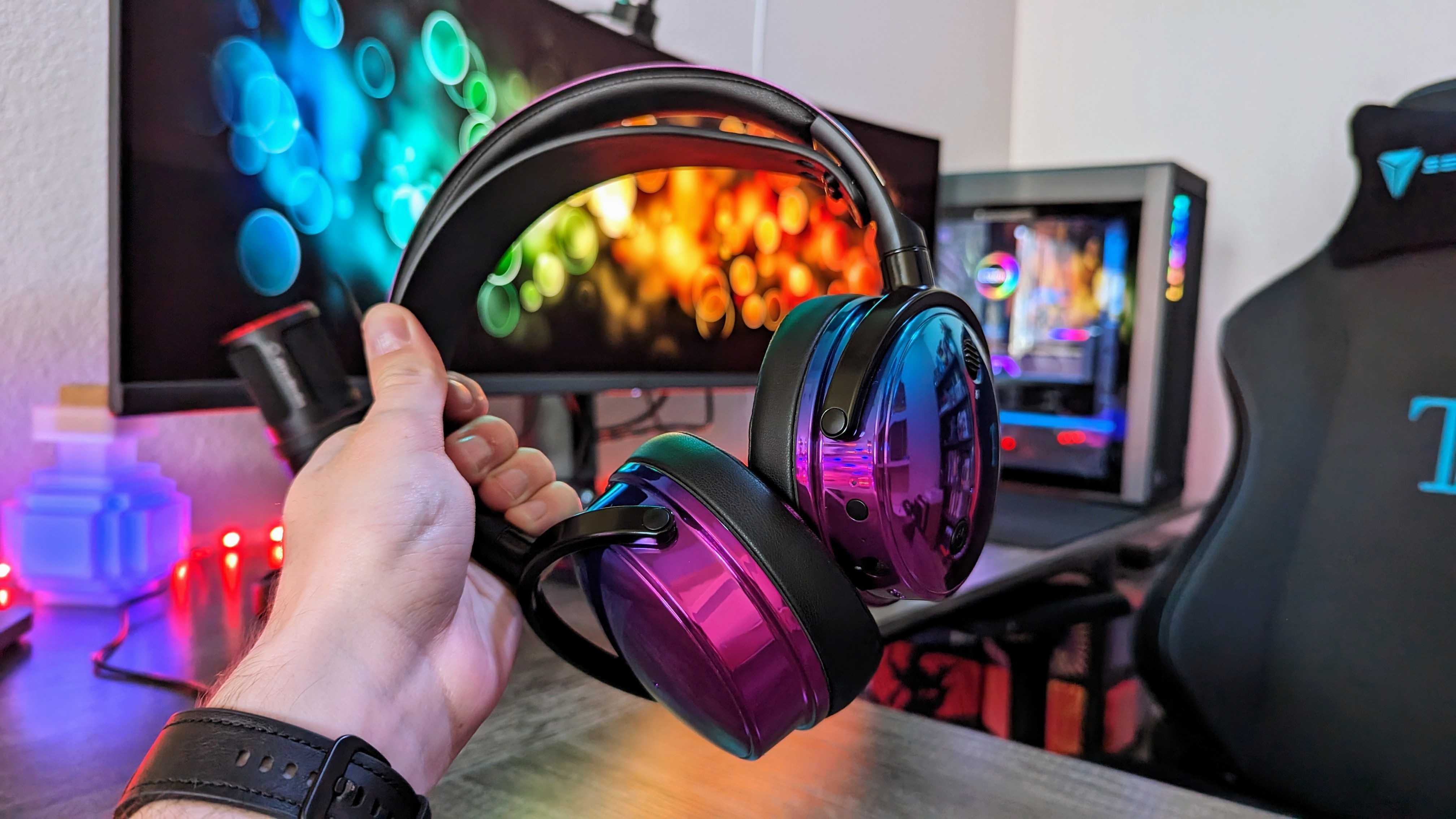
Design highlights
- The design of the Maxwell isn't anything spectacularly attractive, but the build quality is exceptional.
- An aluminum build with a steel spring headband and replaceable head strap and earcup cushions ensure great durability.
- The actual usability of the design isn't perfect, though, with adjustment being frustrating and onboard controls being confusing.
- Design rating: 4/5
• Materials: Aluminum yokes, spring steel headband, glass-infused nylon earcups, leatherette foam cushions
• Weight: 490g (1.08lbs)
• Other details: Leather-like suspension headband with three tiers of adjustment, detachable hypercardioid mic, on-headset controls and dials, soft clamping force
The Audeze Maxwell isn't the flashiest, most obviously premium gaming headset on the market. Well, at least the normal variant you're likely to buy isn't. Audeze sent me the Ultraviolet Limited Edition that was included as part of the Xbox Summer 2023 Collection; it's sold out now, but I have one here, and it definitely stands out. I love the color, but this is a reflective, fingerprint-and-smudge magnet. For the most part, though, the Maxwell looks like a fairly standard closed-back pair of headphones (just with oddly massive earcups).
Build quality is exceptional, though. The fit and finish, the construction, it's all basically perfect. The Maxwell feels every bit like an ultra-premium headset, and I have no doubt it can survive years of wear and tear and outright abuse. Maxwell also made the leather-esque suspension strap, foam earcups, and microphone detachable and replaceable, should you need to. The Maxwell gives me confidence in its durability, and that's no small matter when you're spending this much. It also looks great but is understated enough that you can use it anywhere, even when you're not gaming.
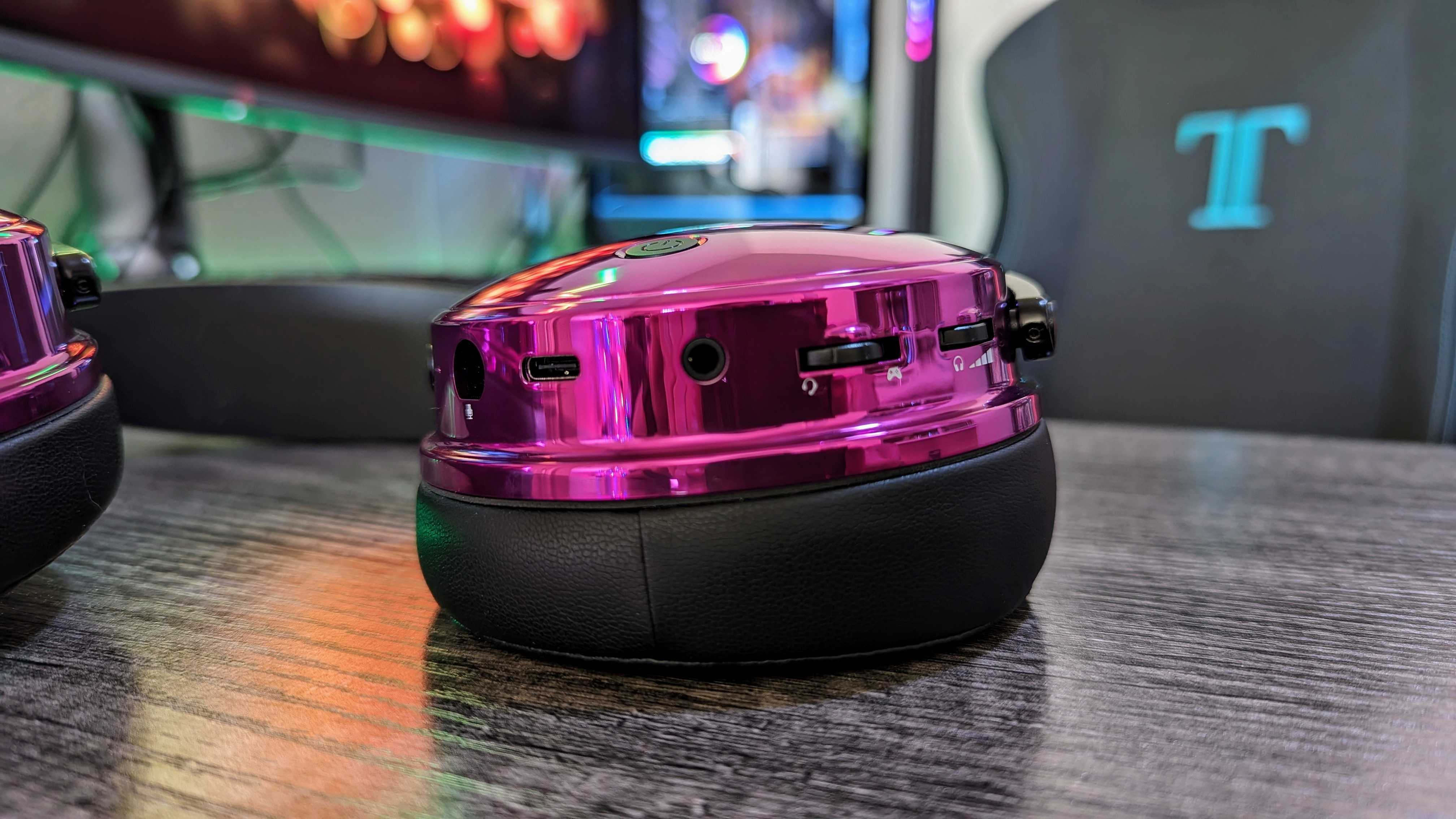
All the headset controls being squeezed onto one earcup is frustrating, though. For one, everything is awfully close together, but these controls also barely make sense. I actually have the Audeze Maxwell user guide open on my phone for reminders because this system isn't intuitive and also holds the Maxwell back from being a true everyday-use pair of headphones. You have the microphone mute switch and power/play-pause/Bluetooth pairing button on the outside of the earcup, the volume dial/previous-next track/EQ preset wheel, the game chat mix/sidetone monitoring volume/sidetone monitoring toggle wheel and, for some reason, an entire button dedicated to the microphone AI noise cancellation along the edge of the earcup.
If that sounds confusing and convoluted, you would absolutely be right. I'm not even going to explain why this is awful for the sake of time, but I will give Audeze some advice: make the power button a way to manually switch between wireless connection modes and the Bluetooth pairing button (hold for power, tap for connection modes, double tap for pairing mode); have a dedicated "smart" button that features all media and call controls via Bluetooth (play/pause and answer calls on single, next track and hang up call on double, previous track on triple, and voice assistant on hold), and the mic mute switch, volume dial, and chat mix dial (using a dial to switch between EQ presets is clever, but do we really need onboard controls just for sidetone monitoring and toggling the AI background noise suppression?).
Audeze Maxwell review: Comfort
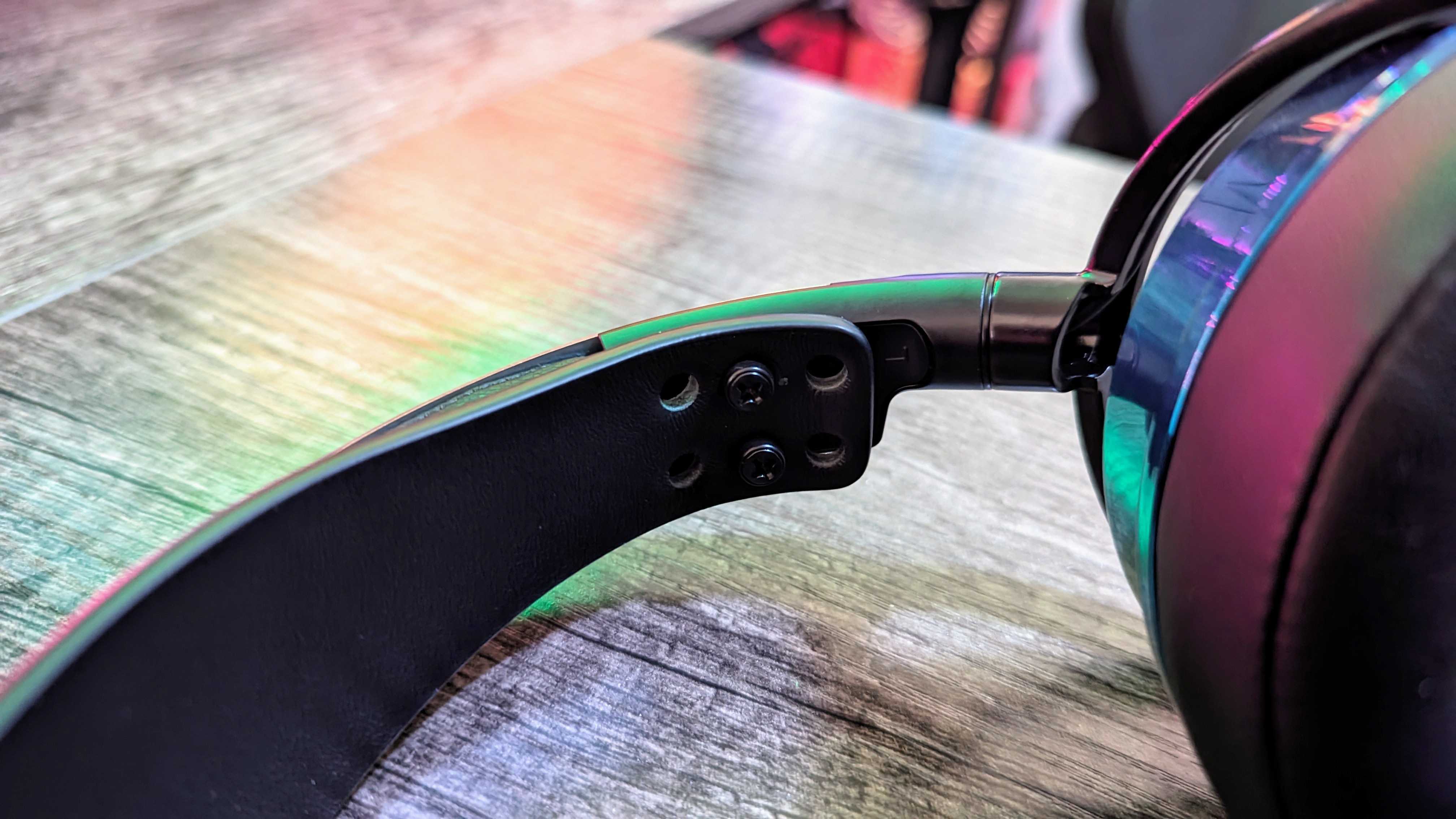
Comfort highlights
- The Audeze Maxwell is about as comfortable as it can get, with supremely soft cushions and a suspension strap for head comfort.
- None of this can change how heavy the Maxwell is, though; it feels very comfortable to wear, but your head and neck can feel fatigued after a while.
- Limited strap adjustment and a soft clamping force can also make finding the perfect fit difficult.
- Comfort rating: 3.5/5
Audeze has done almost everything in its power to make the Maxwell as comfortable as possible, and it shows. The earcups are spacious, and the cushions are incredibly soft, for one. I still believe a suspension strap is the best way to avoid discomfort on the top of your head, and Audeze included a cushion on the headband for even more head comfort. When you first put the headset on, it feels great — but nothing can make this weight disappear. The Maxwell weighs a whopping 490g (to put that into perspective, the also-premium RIG 900 MAX HX weighs just 243g). That's inevitable given the planar magnetic driver technology Audeze is using, but it also means that you will feel this headset on your head and in your neck after a while.
Adjustment is also a little lacking. Audeze went for a soft clamping force (likely overcompensating for criticisms of too-tight clamping forces in previous headsets) and limited all adjustments to just three tiers via the suspension strap. Not only is it frustratingly difficult to yank the suspension strap off its bolts and push it back on at lower or higher tiers, but it provides very little granular control. The Maxwell sits just a tiny bit too low on me, but one tier up, and it sits far too high. Audeze can definitely improve matters here.
Audeze Maxwell review: Sound quality
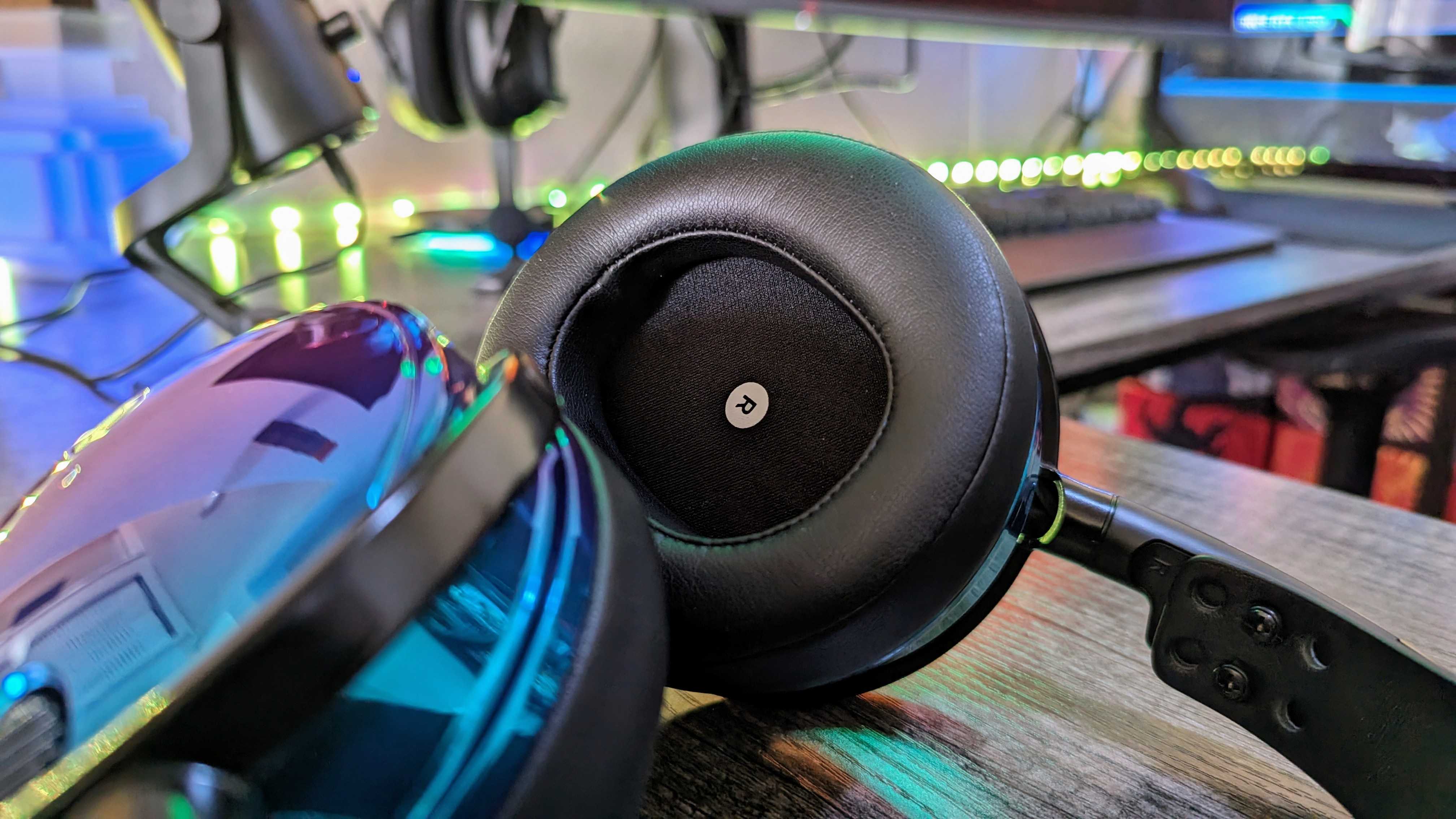
Sound quality highlights
- The Maxwell sells itself with its massive, unique planar magnetic drivers for superior sound quality, and it shows.
- This headset sounds ridiculously good, with as wide of a soundstage as you can get with closed-back headphones.
- Everything sounds wonderfully detailed and balanced, although you don't get a lot of noise isolation.
- Audio rating: 5/5
• Drivers: 90mm planar magnetic w/ neodymium N50 magnets, Fluxor magnet array, Fazor phase management, Ultra-Thin Uniforce diaphragm
• Speaker frequency response: 10Hz to 50,000Hz
• Impedance: 70 ohms
• Speaker sensitivity: >120dB SPL
• Microphone: Detachable hypercardioid boom mic, dual-array internal mics
• Mic features: Physical & AI-powered background noise suppression
• Other details: Dolby Atmos (built-in license w/ Xbox version), Tempest 3D (PlayStation version)
We're finally to what really matters with the Audeze Maxwell: sound quality. Audeze is a company well known for producing premium, "audiophile" grade audio equipment, and its latest foray into gaming is just a side interest. The Maxwell is all about audio fidelity, and it has the hardware and processing chops to truly sit on top of the heap. I'll save you a little bit of time — if you care about sound quality above all else, the Maxwell should be at the top of your list. "Luxurious" is one word that comes to mind when listening to, well, anything with this headset.
One major reason why is that Audeze does away with the dynamic drivers that are standard in most headphones in favor of its planar magnetic drivers. I won't get into all the technical details, but the short rundown is this: planar magnetic drivers are flat (versus the "cone" shape of traditional speaker drivers) and far more precise and responsive. That means less sound distortion at high volumes or with complex sounds, a wider soundstage approaching that of open-backed high-end studio headphones, and a very balanced sound profile that excels at everything from lows to highs.
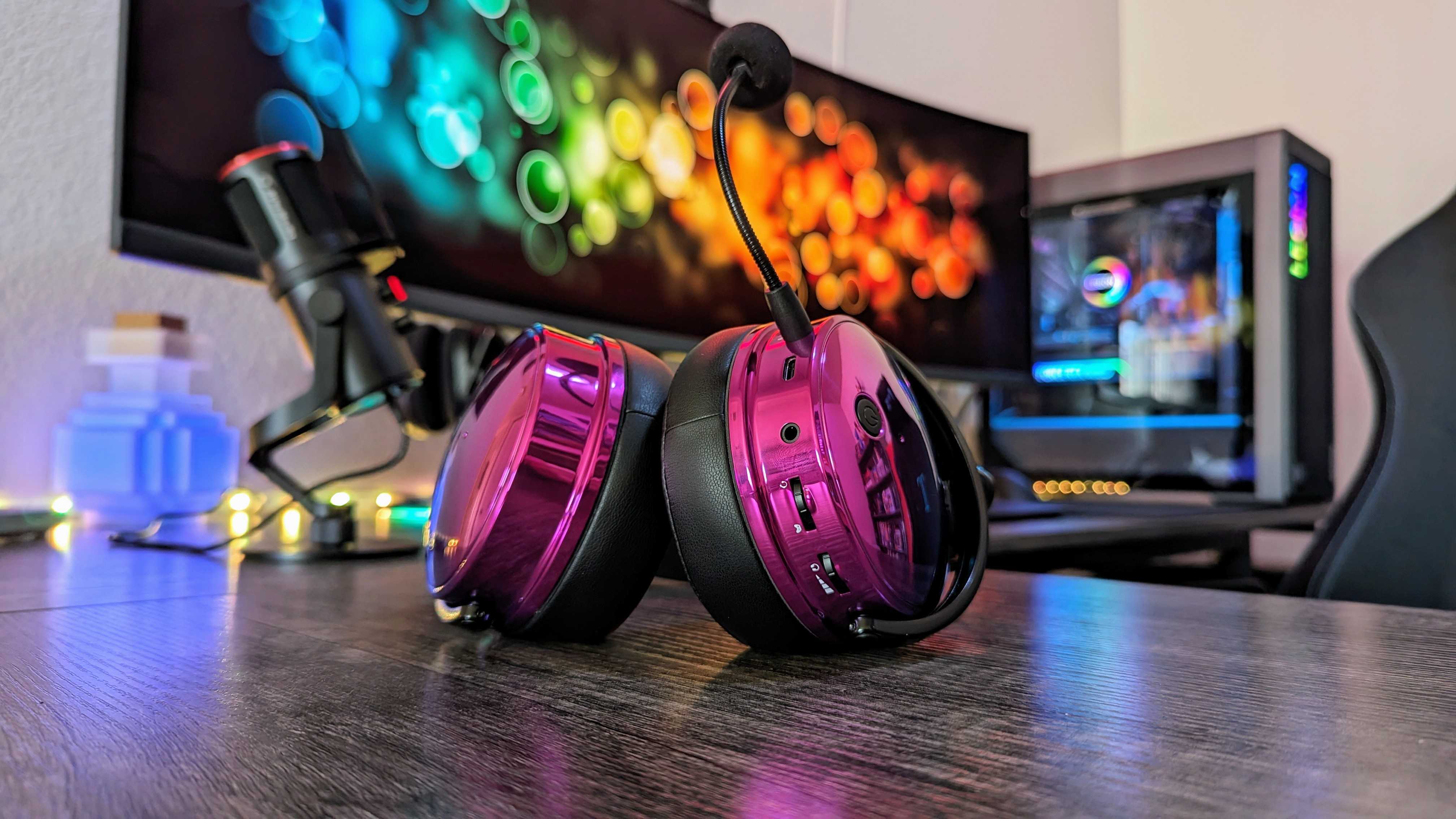
The Audeze Maxwell headset sounds crystal clear with immense detail, a vast soundstage that fully separates each instrument or sound source and blesses your ears with lovely deep bass, distinct mids, and unimpeded highs. The default sound profile works wonders with practically any medium already, but the app lets you tweak that sound with equalizer presets. The Maxwell also has one of the best implementations of Dolby Atmos spatial audio I've heard in a headset, likely because of that wide, dynamic soundstage that already gives everything so much room to breathe.
Planar magnetic drivers aren't without compromise, of course. They're more expensive to produce (this is a premium headset, after all) and are considerably larger and heavier than regular drivers, hence the sizeable earcups the Maxwell boasts. Ostensibly, these drivers are more fragile, too, so maybe be a little extra careful not to drop your Maxwell on hard surfaces. Another small complaint with the Maxwell is the lack of noise isolation (and there's no active noise canceling here). You can still hear practically everything going on around you, which can detract from the marvelous listening experience if background noise is obtrusive enough.
Overall, though, it just sounds delightful. You also get 24-bit/96kHz high-resolution audio support over wireless and wired, thanks to advanced Bluetooth codecs and USB Type-C dual-audio endpoints (more on connectivity later). The Audeze Maxwell is by far the best-sounding headset I've ever had on my head, bringing unparalleled detail and clarity to my gaming and all my favorite songs.
Audeze Maxwell review: Microphone quality
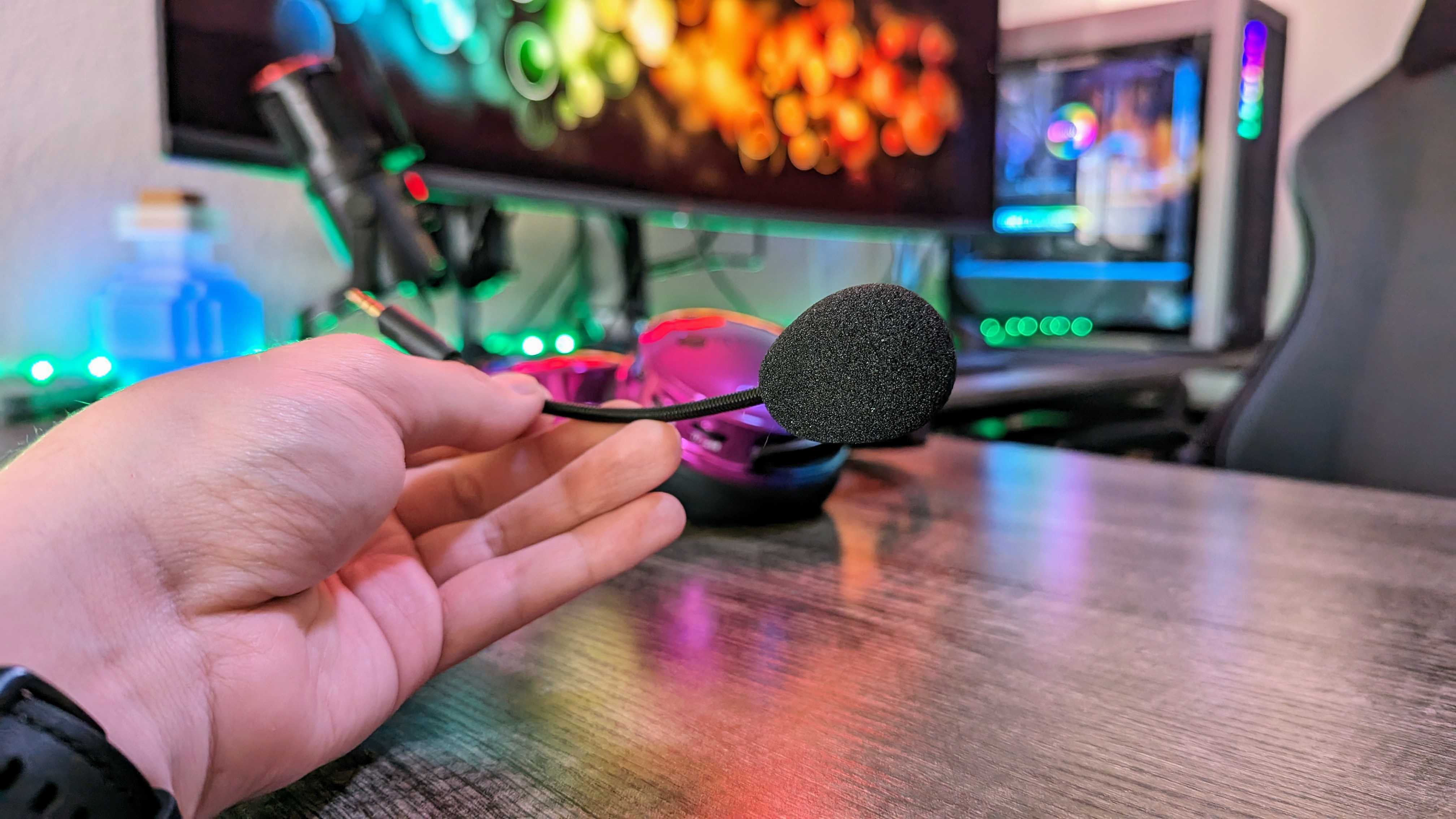
Microphone highlights
- A detachable boom hypercardioid microphone is your primary microphone on the Maxwell, and it actually sounds pretty great.
- Your voice comes in full and clear with plenty of detail, and background noise suppression works well and reliably.
- You can remove the boom mic whenever and instantly switch to the internal dual-array microphones, which still work fine for phone calls.
A lot of headsets — even those that focus on audio fidelity — stumble when it comes to the mic, but I have to applaud Audeze for not skimping in this category. The hypercardioid boom microphone attaches to the Maxwell via the 3.5mm mic jack with a satisfying click, is flexible to get the perfect positioning, and actually sounds quite wonderful. It doesn't quite topple the reigning champion, the Razer BlackShark V2 Pro (2023), but I'd be lying if I said this mic doesn't get awfully close. Recording quality is clear and detailed, your voice sounds full, and the AI-powered noise suppression does a great job filtering out unwanted background noise without clipping your voice.
At any point, you can detach the boom microphone and the Maxwell will instantly switch to its dual-array, beamforming internal mics, which obviously downgrade the audio quality by a decent amount. They're still just good enough for phone calls and casual chats, though, so you can leave the boom microphone at home when using the Maxwell as a general-purpose everyday pair of headphones. The only minor flaw I've noticed is that the Maxwell's mics often take a moment to turn on when beginning a chat or recording. You can hear an audio sample of the Maxwell above.
Audeze Maxwell review: Wireless connectivity
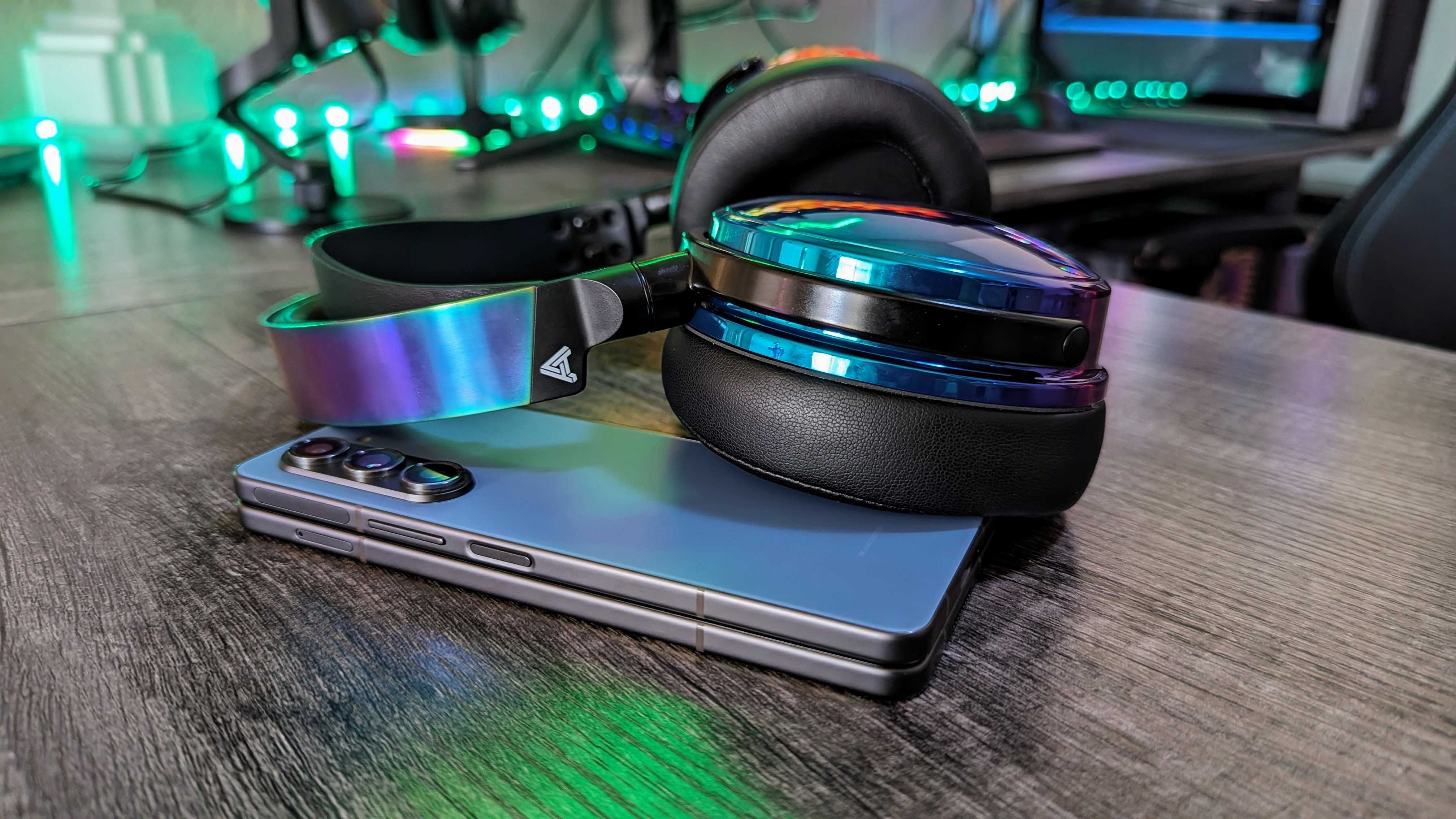
Connectivity highlights
- On paper, the Audeze Maxwell has all the connectivity options you could ever want, and it almost delivers.
- The 2.4GHz offers fantastic performance and reliability. The latest and greatest Bluetooth version is here, with support for every high-res codec under the tree, and there are two different ways to plug in.
- No way to switch between wireless modes manually, and some odd connection priorities make the Maxwell more annoying to use than it should be.
- Connectivity rating: 4/5
• Connectivity: Ultra low-latency 2.4GHz wireless via USB Type-C dongle, Bluetooth 5.3, hi-res wired via USB Type-C, wired via 3.5mm TRRS audio jack
• Platforms: Xbox Series X|S, Xbox One, & Windows PC (2.4GHz), PlayStation 4|5 (PlayStation variant), Windows PC, Nintendo Switch, Android, iOS (Bluetooth)
• Other details: Simultaneous wireless connectivity, no multi-source audio mixing, extra Bluetooth features (Multipoint, LE Audio, LC3, LC3plus, LDAC, AAC, SBC), extra Type-C features (dual-audio endpoints, game-chat mix)
The Audeze Maxwell has one of the most impressive spec sheets for connectivity I've ever seen on a pair of headphones or a gaming headset, but it falls short of greatness because of one egregious omission. You get ultra-low-latency 2.4GHz wireless on Xbox and Windows PCs that is stable and responsive; you get Bluetooth 5.3 with support for basically every high-end audio codec. You get true high-resolution audio playback via USB Type-C, and you can even fall back on the 3.5mm audio jack in a pinch (although you won't get hi-fi audio then).
There's no multi-source audio mixing, unfortunately, but the Maxwell does connect simultaneously to 2.4GHz and Bluetooth... But only for phone calls. You see, there is absolutely zero way to manually switch wireless modes, so whenever your Maxwell is connected to your Xbox... That's it. You can't listen to music or anything else via Bluetooth unless you unplug the 2.4GHz wireless dongle or turn off your Xbox. Connectivity priorities are strange for PCs, too. It's a huge, baffling miss that massively hurts the everyday convenience of this headset. The Maxwell gets connectivity so close to absolute perfection with its support for everything under the sun but frustratingly stumbles in the last few feet by making it needlessly difficult to actually make use of multiple connectivity options.
Audeze Maxwell review: Battery life
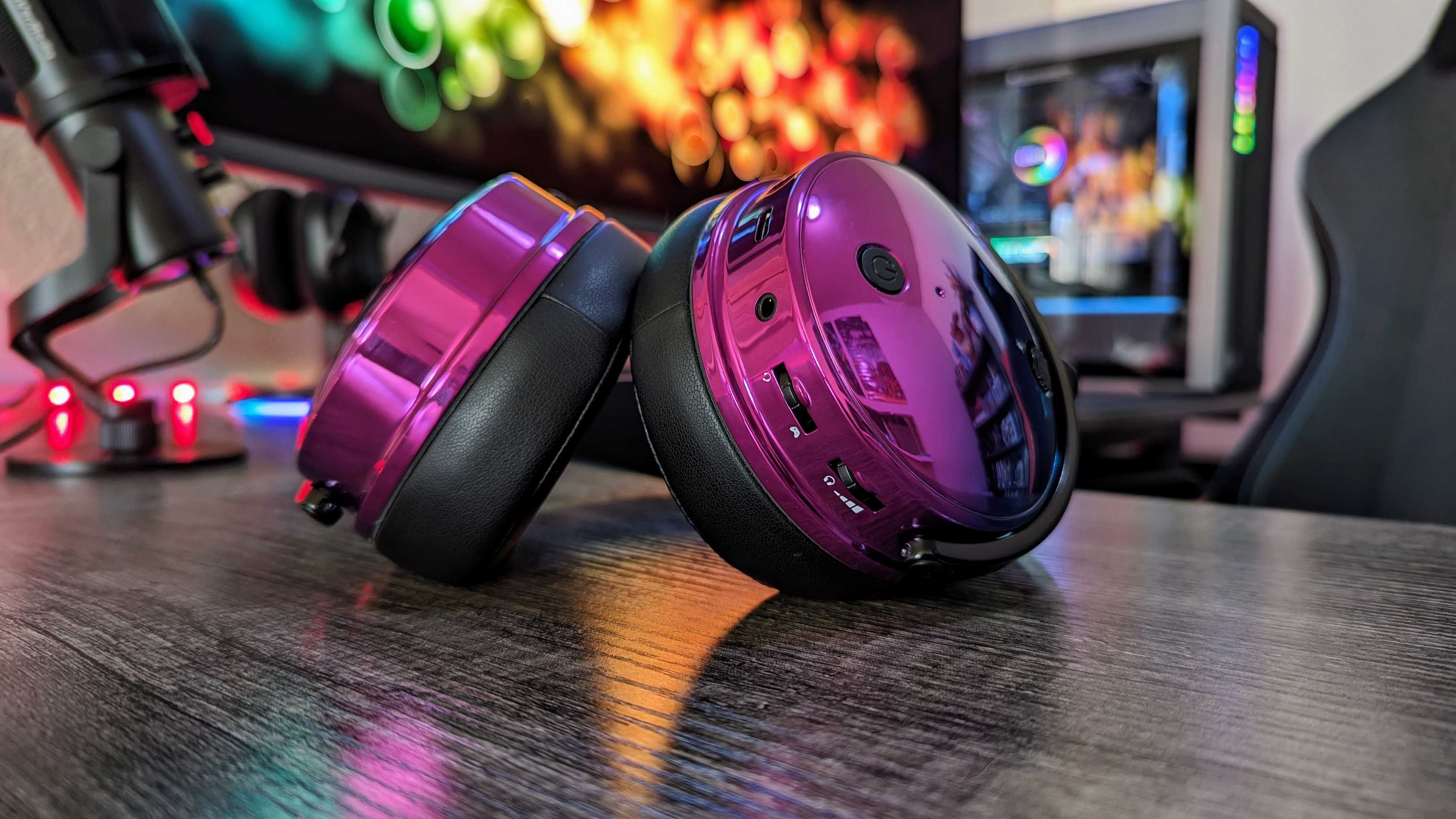
Battery highlights
- Audeze promises up to 80 hours of wireless playback with the Maxwell, and that estimate feels accurate.
- When you need to recharge, USB Type-C fast charging means you can go from 0-100% in less than 3 hours.
- Away from a charger, you can also fall back on USB Type-C wired (hi-fi digital) or 3.5mm audio jack (analog).
- Battery rating: 5/5
I definitely don't need to spend much time on this. Audeze rates the Maxwell for up to 80 hours of continued usage with 2.4GHz wireless (while connected to Bluetooth), and that estimate feels incredibly accurate. Hours of gaming, listening to music, and using the Maxwell in Xbox Party Chat only made tiny dents in the Maxwell's battery percentage, which you can easily check in the app. When you need to charge up, the USB Type-C port can do so in around 2 1/2 hours. Finally, you can always resort to that same Type-C port for true hi-fi audio (even better than via either wireless mode) or the 3.5mm audio jack.
Just keep in mind that the audio jack is TRRS, which means it's a four-ring jack rather than the more common 3-ring jack on cheaper headphones. Because of that, some devices may not be able to run the Maxwell at all. This is a higher impedance headset than many competitors, so it needs extra juice to make some noise.
Audeze Maxwell review: Other features
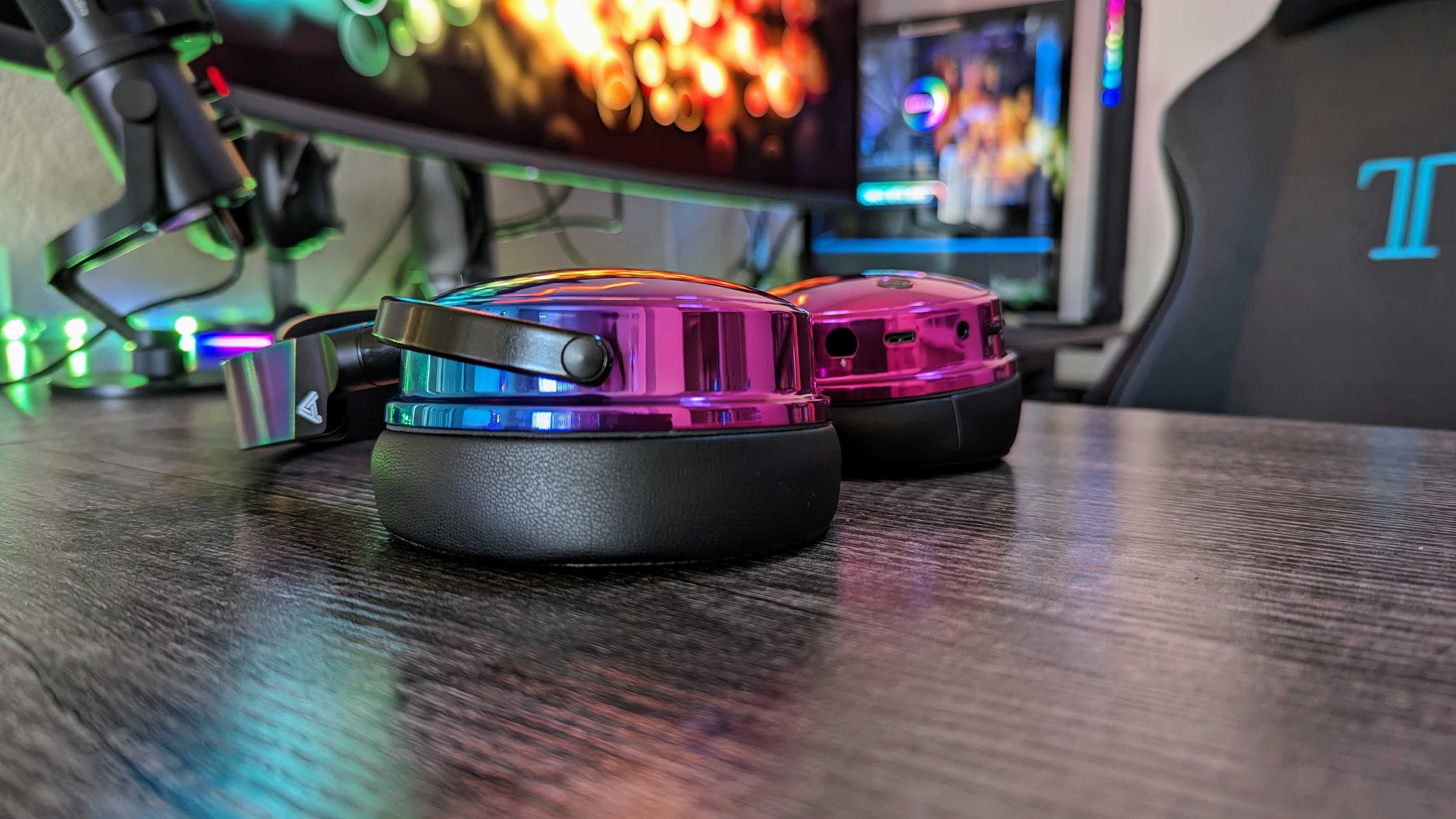
Other features highlights
- The Audeze HQ app lets you configure mic sidetone monitoring, different EQ presets (which are saved to the headset), and simple settings for the auto-shutdown time and voice prompt volume.
- The PC version also lets you update firmware and review the headset's controls, but overall, these apps are pretty light on features.
- There's no active noise cancellation or fancy features on top of that; the Maxwell is all about the sound quality.
There's not a lot to talk about here. The Audeze Maxwell is undoubtedly a very premium gaming headset, but its app is a little barebones, and there aren't a ton of extra features to discuss. The mobile app gives you very basic volume and mic controls and lets you switch between different EQs that are saved to the headset. There are also exactly two options for the headset's auto-shutdown feature and voice prompt volume, and that's it. The PC app adds firmware updates and a simple graphic of the headset's controls on top of that.
You won't find active noise cancellation here, or an included DAC or mixer for extra control, or a charging base station, or even a carrying case in the box. The app isn't going to give you in-depth controls to configure the headset exactly the way you want it. The Maxwell gets really far based on its connectivity prowess, battery life, and audio fidelity, but it doesn't stretch too far beyond that.
Audeze Maxwell review: Competition
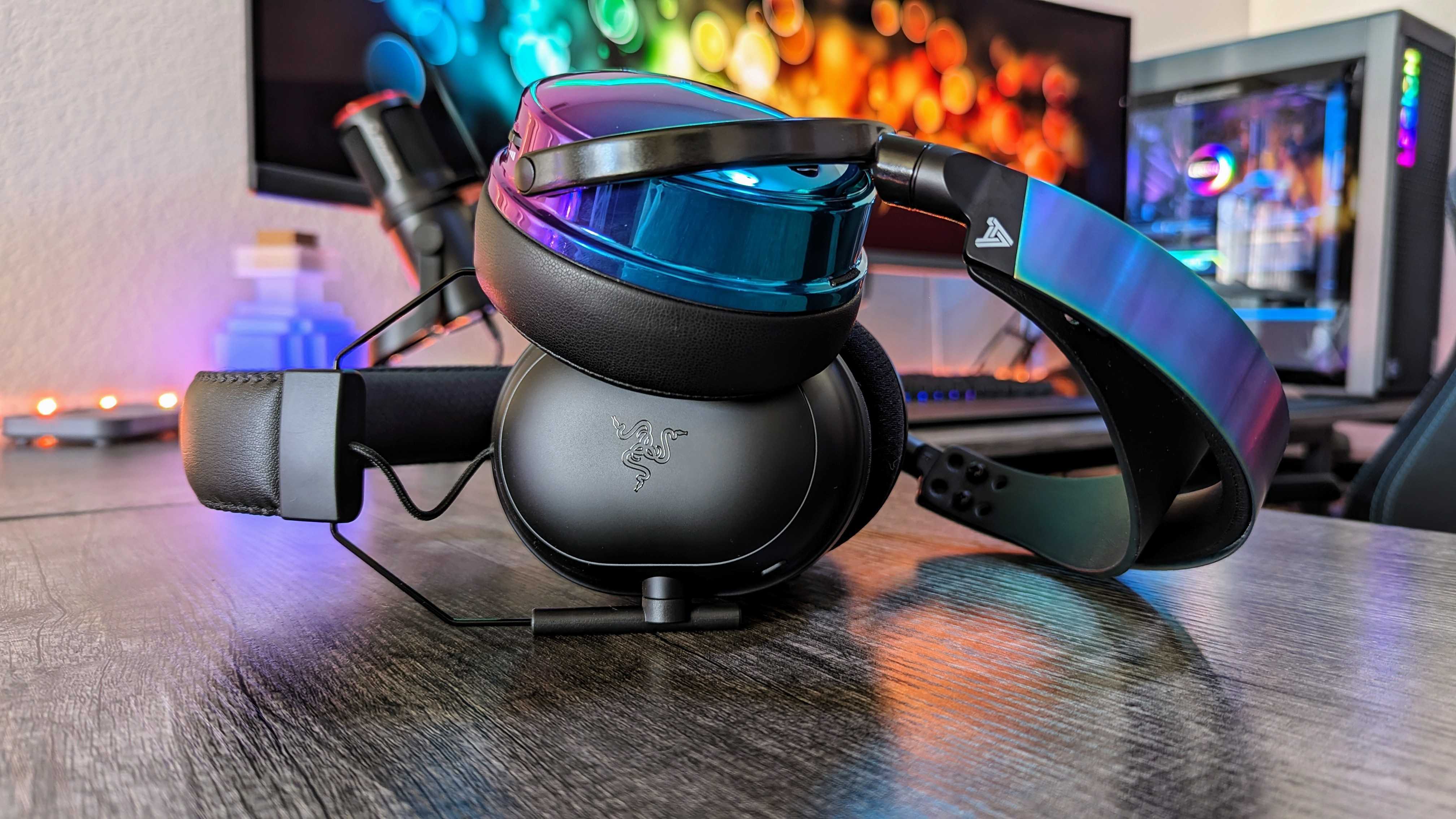
From what I can tell, the Audeze Maxwell has three main competitors in this price sector and category. The Turtle Beach Stealth Pro is our current #1 pick as the best Xbox gaming headset due to its stunning sound quality, premium build quality and industry-leading comfort, intuitive headset controls, active noise cancellation, great software customization, and true multi-source audio mixing. It's a phenomenal gaming headset, but its design isn't the most "everyday use" appropriate. Its swappable battery packs only last 12 hours a pop, and its mic isn't detachable.
The SteelSeries Arctis Nova Pro also gives you luxurious build quality, an included DAC, swappable batteries, active noise cancellation, and multiplatform connectivity. Its streamlined and premium design, combined with its stashable mic, make this a fantastic headset for everyday use, but the SteelSeries app could use some work, and the overall gaming experience isn't quite as lavish as the Turtle Beach Stealth Pro. Finally, there's the new Logitech Astro A50 X, a true multiplatform savant with a premium charging base station and more gaming features than you can shake a stick at. It's very much designed for gaming, though, and Windows Central hasn't reviewed it (yet).
Audeze Maxwell review: Score card
Audeze Maxwell review: Final thoughts
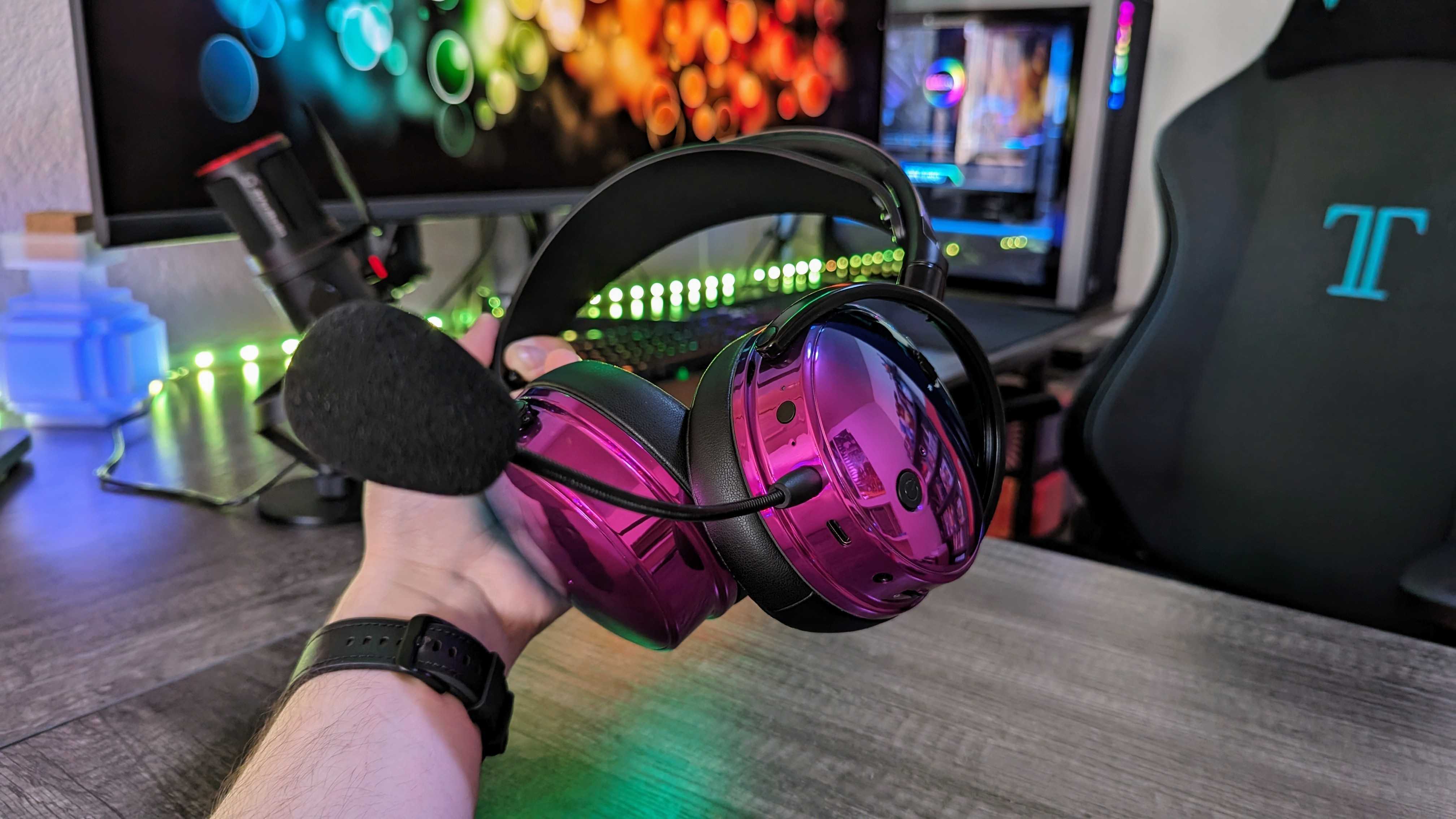
You should buy this if ...
You should not buy this if ...
I love using the Audeze Maxwell to listen to basically anything. It sounds wonderful when I game, when I listen to music, and even when I watch TikToks. This is the best-sounding gaming headset I've ever used, and it'll make you very happy if audio fidelity holds the highest priority for you. The rest of the headset isn't bad, either; the design is premium and well-constructed, there are endless ways to connect to your devices and enjoy hi-fi audio, the battery lasts a long time, wireless performance is impeccable, and the mic is actually quite great.
This is an expensive headset, though, and you're taking on a lot of excess weight versus other premium gaming headsets and sacrificing extra features like active noise cancellation. Audeze also has more work to do when it comes to its software and crafting an intuitive control system for its wireless headsets because it's frankly ridiculous that there's no way to switch to a Bluetooth-only mode without physically shutting off my Xbox or disconnecting the 2.4GHz dongle. If you can forgive those weaknesses in exchange for these luxurious soundwaves, though, the Audeze Maxwell is an excellent Xbox and Windows PC wireless gaming headset... Good luck finding it in stock, though.
If audio fidelity is at the top of the list for your new premium wireless gaming headset, the Audeze Maxwell may be the perfect headset for you. It's heavy and a little awkward sometimes, but its hardware is phenomenal, and that sound quality is no joke. The Maxwell also supports practically every platform under the sun.







